The German press ascribed the outcome to the refugee crisis and to the growing distrust towards Germany’s two main parties, the CDU and the Social Democrats. Marzo 13 elecciones locales alemanas estuvieron marcados por la victoria del Partido Verde de Winfried Kretschmann en Baden-Württemberg, registrar los resultados para el partido de derecha Allianz für Deutschland (AFD) en los tres Länder donde el voto eu lieu le, y las pérdidas de la CDU de la canciller Angela Merkel. La prensa alemana atribuye el resultado a la crisis de los refugiados y la creciente desconfianza hacia dos partes principales de Alemania, la CDU y los socialdemócratas. "Kretschmann gana. Dreyer late Klöckner. AFD en los dos dígitos en los tres estados. La participación fue alta ", titula el Frankfurter Allgemeine Zeitung. Berthold Kohler escribe que - Frankfurter Allgemeine Zeitung, Frankfurt Angela Merkel no estaba en el in'any votación de los tres Länder que los votos a cabo el domingo. Y sin embargo, sus políticas han sido rotundamente rechazada-: durante meses nada como alemán ha agravado el problema de los refugiados. Para Die Welt, "los Verdes-haber tomado una victoria histórica y clara en Baden-Württemberg, por delante de la CDU. Mientras tanto, el SPD ha triunfado en Rheinische Pfalls y desplomado en Sajonia-Anhalt. La formación de un gobierno va a ser complicado ". Selon Ulf Poschardt, Logo - Die Welt, Berlín La crisis de los refugiados, el tema cada vez más dominante de las últimas semanas y meses, ha transformado el panorama político. El triunfo de la AFD indica la aparición de un fuerte, primitivo, incluso la oposición menudo excesiva a la política del gobierno. "En Baden-Würtenberg CDU está detrás de los Verdes. AFD SPD doble de la puntuación. Gran Coalición pierde majorité en dos Tierras. En Sajonia-Anhalt AFD es más del 20 por ciento ". columnistas Bild Rolf Kleine y Ralf Schuler escriben que - Bild, Berlín La crisis de los refugiados ha hecho marca TIC en las elecciones regionales, qui-han puesto patas arriba el ambiente político. Los formar coaliciones-han-sido votadas cabo en los tres estados federales - pero los ministros regionales mismas todavía puede mantenerse en el poder en una nueva constelación. "Populistas obtener una puntuación de dos dígitos, los Verdes celebran un éxito histórico en Baden-Württemberg. El SPD es derrotado, Malu Dreyer es la meta por delante en Mainz ", titula el Süddeutsche Zeitung. Para Heribert Prantl, Süddeutsche Zeitung, Munich Esta super Domingo - con tres votos - regionales, pasará a la historia política alemana: Fue y es una mirada hacia el futuro de la democracia en Alemania. Esto demuestra el desmoronamiento continuo de las antiguas líneas compartidas; y dirigirla a nuestra atención a las amenazas a nuestra democracia, con las letras AFD; el fascismo se movía en el Este. Super Sunday objetivo aussi muestra cómo hacer frente a la amenaza: la compostura constante, la marca comercial de Winfried Kretschmann. "Las encuestas locales se consideran una prueba de confianza. Los ciudadanos se están distanciando de las partes principales. No podemos seguir así ", convencido de Handelsblatt. Sven Afhüppe Sostiene que - Handelsblatt Düsseldorf Si la califican describen el estado psicológico de la sociedad, entonces los resultados electorales en Baden-Württemberg, Renania-Palatinado y Sajonia-Anhalt son por lo menos la señal de advertencia de una pesada pieza de la depresión. Sus votantes de confianza han Retirado de la CDU y el SPD como Pocas veces en la historia de la posguerra de Alemania, se trata pesada para Pérdidas Ambas partes. los votantes de protesta y los ausentes son los verdaderos ganadores de los votos - de reflexión para los partidos establecidos. "AFD se mueve hacia adelante en Baden-Württemberg, Renania-Palatinado y Sajonia-Anhalt. Apunta la gran majorité había escogido la parte de apoyo que la política de refugiados de Angela Merkel ", escribe Die Tageszeitung. Editor en jefe Georg Löwisch añade que - Die Tageszeitung, Berlín Los vencedores de la votación de marzo de R13 son el miedo, el aislamiento y el autoritarismo. La AFD ha sido-lleva la delantera en este sentido, el objetivo no es la causa subyacente. Subyace la cuestión es, de hecho, que muchos jugadores-políticos han perdido la fe en grandes sí mismos y su forma de hacer las cosas. Desconfían de sus bases, desconfían de sus defensores y desconfían de la población en su conjunto. A decir verdad, Desconfían de la propia Alemania. Para toda la campaña electoral, eran incapaces de creer en la preparación del país para ayudar a los necesitados, de creer en Que la Mayoría de los votantes se paciente y honorable. En cambio sí mismos que han hablado en la creencia Que le ánimo del público se volvió agria HAS.
“Kretschmann wins. Dreyer beats Klöckner. AfD in double digits in all three Länder. Turnout was high”, headlines the Frankfurter Allgemeine Zeitung. Berthold Kohler writes that —
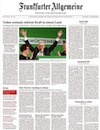
Angela Merkel was not on the ballot in any of the three Länder that held votes on Sunday. And yet her policies have been roundly rejected: for months nothing has aggravated German quite like the question of refugees.
Recibe lo mejor del periodismo europeo en tu correo electrónico todos los jueves
For Die Welt, “the Greens have taken an historic and clear victory in Baden-Württenberg, ahead of the CDU. Meanwhile, the SPD has triumphed in Rheinische Pfalls and plummeted in Saxony-Anhalt. Forming a government will be complicated”. According to Ulf Poschardt,

The refugee crisis, the ever-dominant theme of the past weeks and months, has transformed the political landscape. The AfD’s triumph signals the emergence of a loud, often even primitive opposition to excessive government policy.
“In Baden-Würtenberg CDU is behind the Greens. AfD doubles the SPD score. Great Coalition loses majority in two Land. In Saxony-Anhalt AfD is over 20 percent”. Bild columnists Rolf Kleine and Ralf Schuler write that —
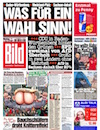
The refugee crisis has made its mark on the regional elections, which have upended the political environment. The former coalitions have been voted out in all three Länder – but the regional ministers themselves may still hold on to power in a new constellation.
“Populists get a double digit score, the Greens celebrate an historic success in Baden-Württenberg. The SPD is defeated, but Malu Dreyer is ahead in Mainz”, headlines Süddeutsche Zeitung. For Heribert Prantl,
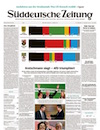
This super Sunday – with three regional votes – will go down in German political history: it was and is a glimpse into the future of Germany’s democracy. It shows the continued crumbling of the old party-lines; and it directs our attention to the threats to our democracy, bearing the letters AfD; fascism is stirring in the East. But Super Sunday also shows how to counter the threat: with steady composure, the trademark of Winfried Kretschmann.
“Local polls are considered a confidence test. Citizens are distancing themselves from the main parties. We cannot go on like this,” believes Handelsblatt. Sven Afhüppe argues that —
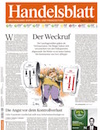
If votes describe society’s psychological state, then the electoral results in Baden-Württemberg, Rheinland-Pfalz and Sachsen-Anhalt are at the very least the warning sign of a heavy bout of depression. Voters have withdrawn their trust from the CDU and the SPD like rarely before in Germany’s post-war history, dealing heavy losses to both parties. Protest voters and absentees are the real winners of the votes – food for thought for the established parties.
“AfD moves forward in Baden-Württemberg, Rhineland-Palatinate and Saxony-Anhalt. But the vast majority had chosen the parties that support Angela Merkel’s refugee policy”, writes Die Tageszeitung. Editor-in-chief Georg Löwisch adds that —
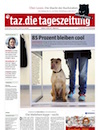
The victors of the 13 March votes are fear, isolationism and authoritarianism. The AfD has been leading the pack in this respect, but is not the underlying cause. The underlying cause is, in fact, that many big political players have lost faith in themselves and their way of doing things. They mistrust their grassroots, they mistrust their supporters and they mistrust the population as a whole. Truth be told, they mistrust Germany itself. For the entire election campaign, they were incapable of believing in the country’s readiness to help those in need, of believing in that the majority of voters are patient and honourable. Instead they have talked themselves into believing that the public mood has turned sour.












